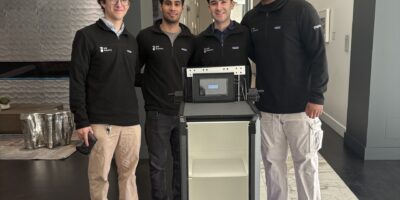The winning proposal to produce Wat PD Engineering 20, the replacement for PD Eng 15, was decided at the July 7th meeting of the Wat PD Engineering Curriculum Committee. The team comes from the Department of Philosophy with implementation lead Greg Andres bringing experience in both distance education and teaching to non-philosophy students and curriculum lead Tim Kenyon, Chair of the Department. Other members of the team include Gerald Callahan, with extensive experience in producing online courses and professional engineer Chris Eliasmith who is cross-appointed with Systems Design Engineering.
The preliminary design review occurred July 14th, with the Centre for Learning Excellence and professional engineers joining the curriculum committee to review and provide feedback to the proposal. Unlike the development of most courses, the curriculum committee will continue to provide oversight to the course until the second design review in early September.
“The course will introduce students to the professional practices of critical thinking and clear communication. It focuses on how one is thinking and acting, and on communicating one’s reasoning clearly, in the context of typical co-op and long-term engineering placements. The unifying course theme of PD 20 is critical metacognition in professional contexts. “ {From the proposal}
The main theme is critical thinking about how we think and come to decisions and the implementation lead is eager to incorporate engineering examples to demonstrate the key ideas. I sat down with Tim Kenyon and Greg Andres to further clarify aspects of the proposal.
On their approach to teaching online: Students must be engaged with the content and verbal instruction is ideal, preferably including 2-way feedback and communication. While text will be offered as a supplement, the main instruction will come in the form of a video lecture (with transcripts for those who prefer/require written instruction).
On incorporating engineering content: Each module will be introduced by a video with a professional engineer, professor, student or panel, with the majority intended to be practicing engineers from industry. The introduction will illustrate an example or case study of an engineering decision and what can be learned from it. Furthermore, Greg Andres intends to be a “fly on the wall” in engineering over the next few months to learn the engineering perspective.
On the format of the course: After the introduction, the rest of the module will flesh out the issues involved in the example and look at the theory and general application of the lesson. Finally, there will be supplemental readings of case studies or academic or professional papers to reinforce the content.
On the workload required: The course is designed to take approximately 30 hours, with 10 hours or less spent on the deliverables. The curriculum committee will review the workload to ensure this is reasonable for a first-year engineer.
On assessment (Note: while much of the content, design, etc. could still change, the assessment component, in particular, is still under review): Each week, the module will contain a brief, multiple-choice quiz to ensure students have read the content before progressing in the course. There will be two main assessments (eg. midterm and final), both with a short answer and written component. Additionally, two of the modules will have a 200-300 word writing assignment. There will also be an opportunity to develop feedback and reflection skills in the subsequent week. For example students might review and provide feedback to the assignment of another (anonymous) student.
On similarities to existing courses: The theme, critical thinking, is similar to that of Philosophy 145. However, content will be removed to reduce to 30 hours of course material. The ‘grand philosophical questions’ will be left aside in favour of further application to broader social situations.
On philosophy and engineering: The course is not about philosophy, but about critical reasoning. As Greg Andres stated in our interview, “I will not be surprised if students do not realize I am a philosopher.” The intent of the course is to give students global skills in a professional context.
The curriculum team, along with the curriculum committee, is excited among creating meaningful, relevant content for engineers on co-op. Ideally, the skills will be relevant in an engineering workplace as well as a more global environment. The tangible ability to reflect upon one’s engineering thought process is intended to put Waterloo engineers at an advantage when competing in an industry environment.




Leave a Reply